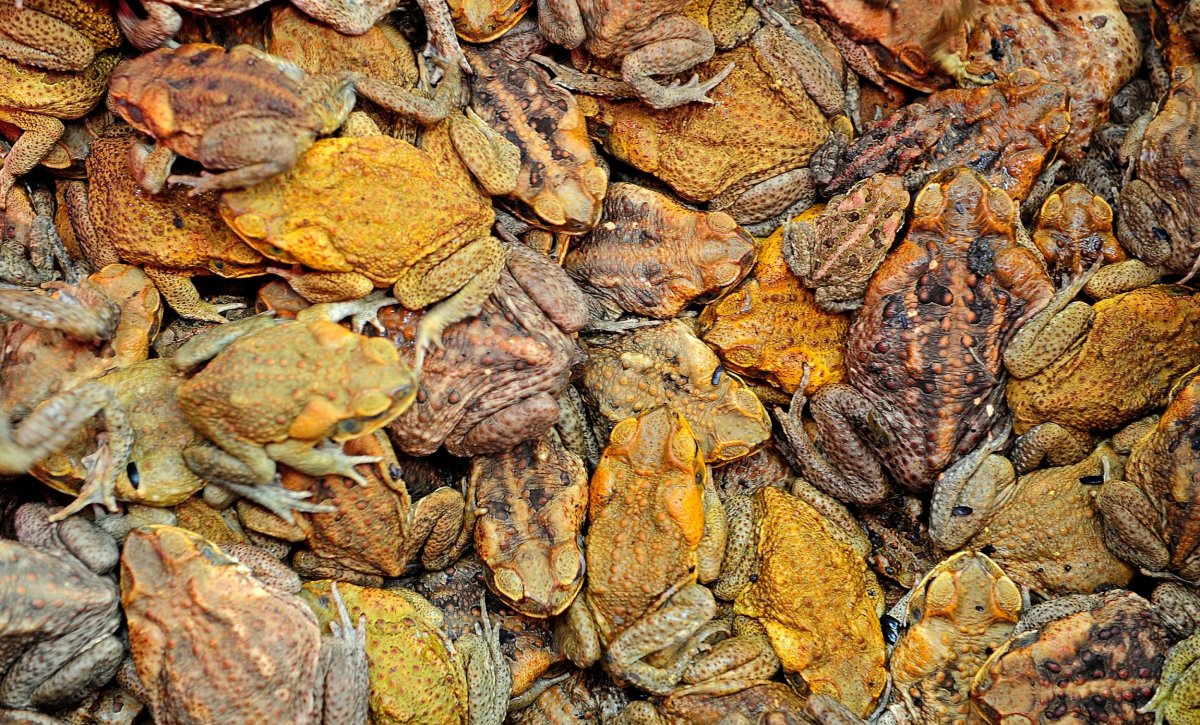An invasion of poisonous toads in Florida's Palm Beach Gardens has prompted concern among residents of the town.
Thousands of the toxic Bufo toads have swarmed the area, ending up in the pools and patios of people living in the Mirabella neighborhood, WPTV reported.
The amphibians, also known as cane toads, emit toxic secretions that can kill animals, CBS 12 reported.
Melinda Schuman, a biologist at the Conservancy of Southwest Florida, told Newsweek that the secretions from cane toads are only used in defense and that the toads "cannot squirt" the toxins. Schuman said that children and adults should not pick up the toads with bare hands "because the secretions can be irritating to eyes, nose or mouth along with any open wounds."
Mark Holladay, lead technician of toad removal company Toad Busters, told CBS Miami that the influx of toads was due to a warm winter, followed by "torrential rain" a few weeks ago. The downpour catalyzed a breeding cycle, Holladay said.
Newsweek reached out to the Florida Environmental Pest Management, the Florida Fish and Wildlife Conservation Commission and the Palm Beach County Health Commissioner but had not received comment at the time of publication.
Schuman noted that the amphibians, which are not from Florida, have been in the state since at least the 1950s. "At this point there will not be a way to eliminate all cane toads from Florida, but with research and management it may be possible for the populations to be kept in check," she told Newsweek.
Many of the toads normally die during the winter, but more forgiving temperatures this year meant fewer of the toads died, Lizz Egan, a media representative from Toad Busters, told The Palm Beach Post. She described the situation as a "toad vortex" and said "we've been fielding calls all day from all the counties. People are all of a sudden inundated with toads."
Holladay told WPTV that more toads would be born in 22 days and would affect "every community in Florida."

Local resident Jenni Quasha told CBS Miami that her children were on spring break and her daughter was afraid to go outside because of the reams of toads. Quasha also told ABC 25 that she thought the lake behind the community was a breeding ground for the amphibians.
The homeowners association disagreed.
"This event is a natural course of nature not having anything to do with an in balance within the ecosystem of the lake. Both Northern and Solitude agreed, the toads are babies of the Bofu (cane) species. The majority of the babies will die. The opinion is that this is an isolated occurrence not derived from the lake," a message from Lang Management said in a letter to residents, according to CBS 12. "It is suggested, to avoid attracting toads to areas where pets are, do not leave pet food in open dishes in the yard. Bufos are attracted to dogs' watering dishes and may sit in the rim long enough to leave enough toxin to make a dog ill."
This article has been updated to include comments from Melissa Schuman.
Uncommon Knowledge
Newsweek is committed to challenging conventional wisdom and finding connections in the search for common ground.
Newsweek is committed to challenging conventional wisdom and finding connections in the search for common ground.
About the writer
Daniel Moritz-Rabson is a breaking news reporter for Newsweek based in New York. Before joining Newsweek Daniel interned at PBS NewsHour ... Read more
To read how Newsweek uses AI as a newsroom tool, Click here.








